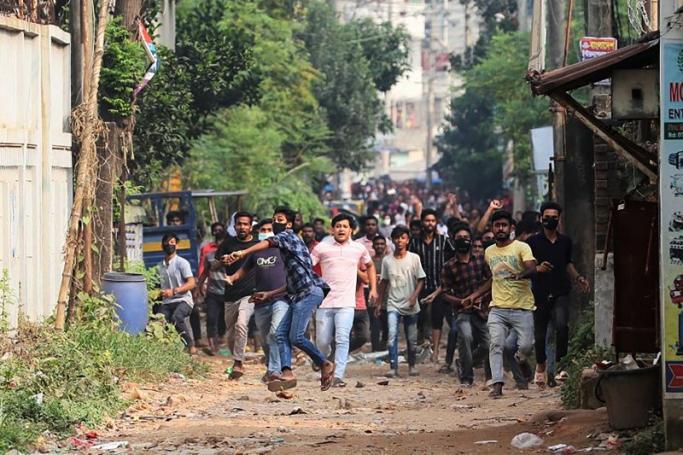AFP
Striking Bangladesh garment workers clashed with police on Saturday near the capital as factories reopened in defiance of a protest campaign demanding a near-tripling of wages.
Bangladesh's 3,500 garment factories account for around 85 percent of the South Asian country's $55 billion annual exports, supplying many of the world's top names in fashion including Levi's, Zara and H&M.
But conditions are dire for many of the sector's four million workers, the vast majority of whom are women whose monthly wages start at 8,300 taka ($75).
Police said some 600 businesses shuttered over the week had reopened in areas worst-hit by the strike, which saw some factories ransacked and set alight.
But clashes broke out in the industrial town of Ashulia, west of the capital Dhaka, after around 10,000 workers attempted to prevent their colleagues from returning to their shifts.
"They hurled stones and bricks at officers and factories and tried to block roads," Ashulia police chief Mohammad Sarowar Alam told AFP.
"We dispersed them by firing tear gas," he said, adding that 1,500 security forces personnel had been deployed there and in nearby Savar to keep order.
A 35-year-old woman was critically injured when police fired rubber bullets and tear gas at hundreds of protesters at Sreepur, some 60 kilometres (40 miles) north of Dhaka, police inspector Ibrahim Khalil told AFP.
Imran Khan, the woman's nephew, told AFP she had been struck by rubber bullets on the face three times.
Workers also returned to their shifts after a week of violent protests in Gazipur, an industrial neighbourhood on Dhaka's northern outskirts.
"Authorities have assured us they will hike our wages within one week. That's why we returned to the factories," garment worker Rokon Uzzaman told AFP.
"We don't have any savings. How long can we continue the protest if we can't feed our families?" he added.
Bangladesh Garment and Industrial Workers Federation president Kalpona Akter told AFP Friday that the weeklong protests had disrupted production for some of the world's top fashion brands.
"They include Gap, Walmart, H&M, Zara, Inditex, Bestseller, Levi's, Marks and Spencer, Primark and Aldi," she said.
A Primark spokesperson said the Dublin-headquartered fast-fashion retailer had not "experienced any disruptions to our supply chain".
"We remain in contact with our suppliers some of whom in turn have closed their factories temporarily," the spokesperson added.
- 'Many workers are half-starving' –
Garment workers say that a sharp increase in living costs has left them struggling to provide for their families.
The Bangladesh Garment Manufacturers and Exporters Association (BGMEA), which represents factory owners, has offered workers a 25 percent pay raise.
That is significantly short of the 23,000 taka ($209) monthly wage that the protest campaign has called for.
"The brands and retailers only care about smooth shipments and profit. But they don't care about the wellbeing of the workers at the bottom of the supply chain or the fact that many workers are half-starving," Akter told AFP.
"We hope the brands will put pressure on Bangladesh manufacturers to make sure they pay the wage the workers are demanding."
The protests have coincided with separate violent demonstrations by opposition parties demanding the resignation of Prime Minister Sheikh Hasina ahead of elections due in January.
AFP












